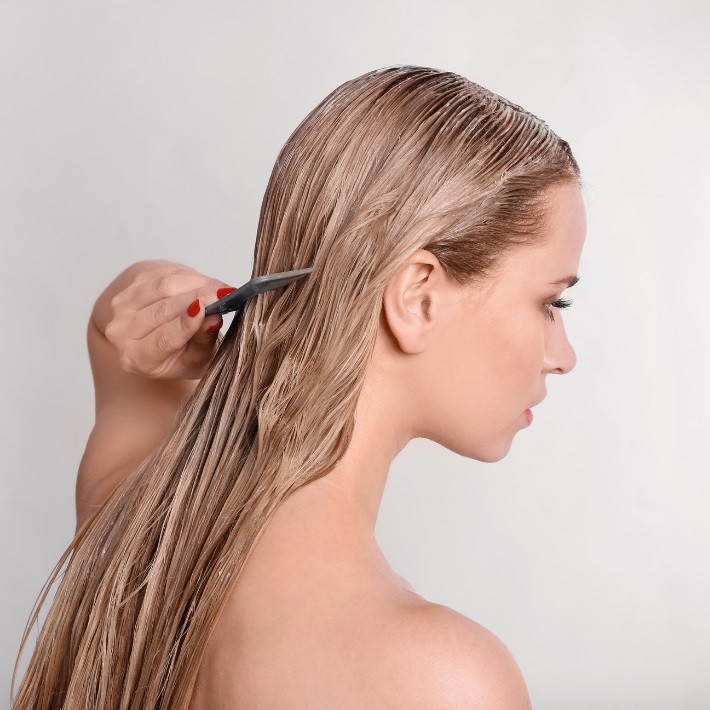Last Updated on March 28, 2025
Salt Water can be damaging to your hair. While it may provide some benefits, such as adding texture and volume, it can also cause dryness, breakage, and color fading.
As much as we love the idea of soaking up the sun and splashing around in saltwater during summer, there’s something that we often forget – the damage salt water can do to our hair. A day at the beach might leave us with sun-kissed skin, but it could also leave our hair feeling dry, rough, and tangled.
But is there some truth to the claims that saltwater is actually good for our hair? Some sources suggest that it can add texture and volume, while others caution that the high salt content can cause breakage, dryness, and color fading. We will examine the effects of saltwater on hair and explore whether the ocean can indeed be our hair’s best friend or worst enemy.
The Effects Of Salt Water On Hair

Salt water is a go-to remedy for skin issues, but many of us wonder whether it is equally beneficial for our hair. Let’s dig deep into the effects of salt water on hair and unveil the mysteries.
Related: Biotin VS Collagen For Hair Growth?
How Does Salt Water Affect Hair Texture?
Salt water is known to give hair a texturized look, providing a wavy, beachy bounce to it. The added texture can also make it easier to style and give the illusion of thicker hair. This might not be the case for everyone.
Salt water can also dehydrate hair, causing it to feel brittle and rough. This is because salt water can dissolve the natural oils produced by the scalp, leading to dryness and tangling.
Does Salt Water Damage Hair?
While salt water may not damage hair directly, the effects of dehydration and tangling can cause other issues in the long run. For instance, dehydrated hair is more prone to breakage, split ends, and dullness. Additionally, tangles can cause hair to be pulled out from the root.
Salt water can also cause scalp irritation, leading to itching and flaking, which is not good for hair health.
What Are The Benefits Of Salt Water For Hair?
Salt water is rich in minerals like sodium, magnesium, and calcium that can help nourish the hair follicles. Some of the benefits of salt water for hair are:
- Promotes hair growth: The minerals in salt water can stimulate circulation and promote hair growth.
- Treats scalp ailments: Salt water has antiseptic properties that can help in treating various scalp ailments like dandruff, psoriasis, and eczema.
- Provides volume: Salt water can lift the hair cuticles, making hair appear more voluminous.
- Offers a natural solution: Saltwater is a natural solution and can be a great alternative to chemical-laden hair treatments.
So, is salt water good for your hair? While there are some benefits of using salt water, the cons outweigh the pros. It’s better to take precautions and protect your hair against salt water’s side effects by wearing a hat or applying a protective leave-in conditioner before hitting the beach.
Tips For Protecting Your Hair From Salt Water Damage
Salt water can be fun to swim in during hot summer months, but what does it do to hair? Before heading to the beach, it’s important to know how salt water affects hair and how to protect it. Here are some tips for protecting your hair from salt water damage.
Pre-Swim Hair Care Routines
Before diving into the ocean, it’s recommended to do some pre-swim hair care routines to minimize damage caused by salt water. These include:
- Apply sunscreen to protect hair from harmful UV rays.
- Apply a leave-in conditioner or hair oils to enhance and lock in moisture.
- Tie up hair in a bun or braid to reduce tangling and minimize exposure to salt water.
How To Rinse Salt Water From Hair Properly?
Rinsing hair properly after swimming in salt water is essential to prevent salt buildup and damage. Here are some steps to follow:
- Rinse hair with fresh water to remove sand, salt, and chlorine.
- Apply a clarifying shampoo to cleanse hair deeply and remove salt buildup.
- Use a moisturizing conditioner to hydrate and replenish lost moisture.
- Detangle hair gently using a wide-tooth comb, starting from ends to roots.
Protective Hairstyles For The Beach
Protective hairstyles are not only stylish but also help to protect hair from salt water damage. Here are some protective hairstyles to try on your next beach day:
- Top knot bun
- French braid
- Low Ponytail
- Twists
- Headscarf or hat
Remember to apply a leave-in conditioner or hair oil before styling to prevent damage and maintain moisture throughout the day.
Related: Can You Reverse Grey Hair?
Natural Remedies For Restoring Hair After Salt Water Exposure

Have you ever jumped into the ocean or spent a day at the beach, only to notice your hair feeling dry, tangled, and brittle? If so, you’re not alone. Salt water can wreak havoc on your locks, leaving you wondering if it’s good for your hair.
The answer? Well, it depends. While salt water can offer some benefits, like adding texture and volume, it can also strip your hair of its natural oils and cause damage over time. Luckily, there are some natural remedies you can try to restore your hair after exposure to salt water.
Homemade Hair Masks For Nourishment
One of the best ways to restore your hair after salt water exposure is with a homemade hair mask. Hair masks are packed with nourishing ingredients that can help hydrate your hair, restore its natural oils, and improve its overall health.
Here are some effective DIY hair masks you can try:
- Avocado and honey mask: Mix one mashed avocado with two tablespoons of honey. Apply to your hair, leave it on for 30 minutes, and rinse thoroughly.
- Banana and yogurt mask: Blend one ripe banana with half a cup of plain yogurt. Apply to your hair, leave it on for 30 minutes, and rinse thoroughly.
- Coconut oil and honey mask: Mix two tablespoons of coconut oil with one tablespoon of honey. Apply to your hair, leave it on for 30 minutes, and rinse thoroughly.
How To Incorporate Essential Oils Into Your Hair Care Routine?
Essential oils are another great way to restore your hair after salt water exposure. Not only do they smell amazing, but they also have numerous benefits for your hair, like promoting growth, reducing inflammation, and restoring shine. Here are some ways to incorporate essential oils into your hair care routine:
- Add a few drops of essential oil to your shampoo or conditioner.
- Mix a few drops of essential oil with a carrier oil like coconut or jojoba oil and use it as a pre-shampoo treatment.
- Create a DIY spray by mixing distilled water with a few drops of essential oil and spritzing it on your hair.
Some of the best essential oils for restoring hair after salt water exposure include lavender, peppermint, rosemary, and tea tree oil.
Best Foods For Promoting Hair Health After Salt Water Exposure
Finally, there are some foods you can add to your diet that can help restore your hair after salt water exposure. These foods are packed with vitamins, minerals, and antioxidants that can promote hair growth, reduce inflammation, and nourish your hair from the inside out.
Here are some of the best foods for promoting hair health after salt water exposure:
- Salmon: A great source of omega-3 fatty acids, which can reduce inflammation and promote hair growth.
- Sweet potatoes: Contains beta-carotene, a precursor to vitamin A, which can promote healthy hair growth.
- Spinach: Loaded with iron and vitamin C, which can improve circulation and promote hair growth.
- Eggs: A good source of biotin, a b vitamin that is essential for healthy hair.
While salt water can have some benefits for your hair, it can also cause damage over time. To restore your hair after salt water exposure, try these natural remedies like diy hair masks, essential oils, and incorporating hair-healthy foods into your diet.
With a little TLC, your hair can be restored to its full health and shine in no time.
Related: How to Do Hair Tinsel at Home
Frequently Asked Questions On Is Salt Water Good For Your Hair?
Is Salt Water Damaging To Hair?
Salt water can cause hair damage by drying it out and creating tangles, but regular cleansing can help prevent damage.
Does Salt Water Help Hair Growth?
Salt water does not directly promote hair growth, but it can prevent certain scalp conditions that impede it.
Can Salt Water Change Hair Color?
Salt water can cause hair color to fade or lighten, especially with prolonged exposure and the presence of sunlight.
How Often Should You Wash Your Hair After Swimming In Salt Water?
It is recommended to wash your hair with fresh water after swimming in salt water to remove salt buildup.
Is It Okay To Swim With Dyed Hair In Salt Water?
Swimming with dyed hair in salt water can cause damage, fading, and dryness, making it important to use caution and conditioner.
Conclusion
As with most things in life, moderation is key when it comes to the impact of salt water on our hair. While some salt water exposure can promote healthy hair growth, too much can have negative effects such as dryness and breakage.
The high salt concentration in seawater can strip the hair of its natural oils, leaving it brittle and prone to split ends. It’s recommended to rinse hair with fresh water after swimming in the ocean or saltwater pool to remove any excess salt.
Using a hydrating conditioner and limiting heat styling can help combat the drying effects of salt water on hair. Overall, while the minerals in salt water can have positive benefits for hair, it’s important to be cautious of overexposure and take steps to protect and nourish hair to maintain its health and vitality.

